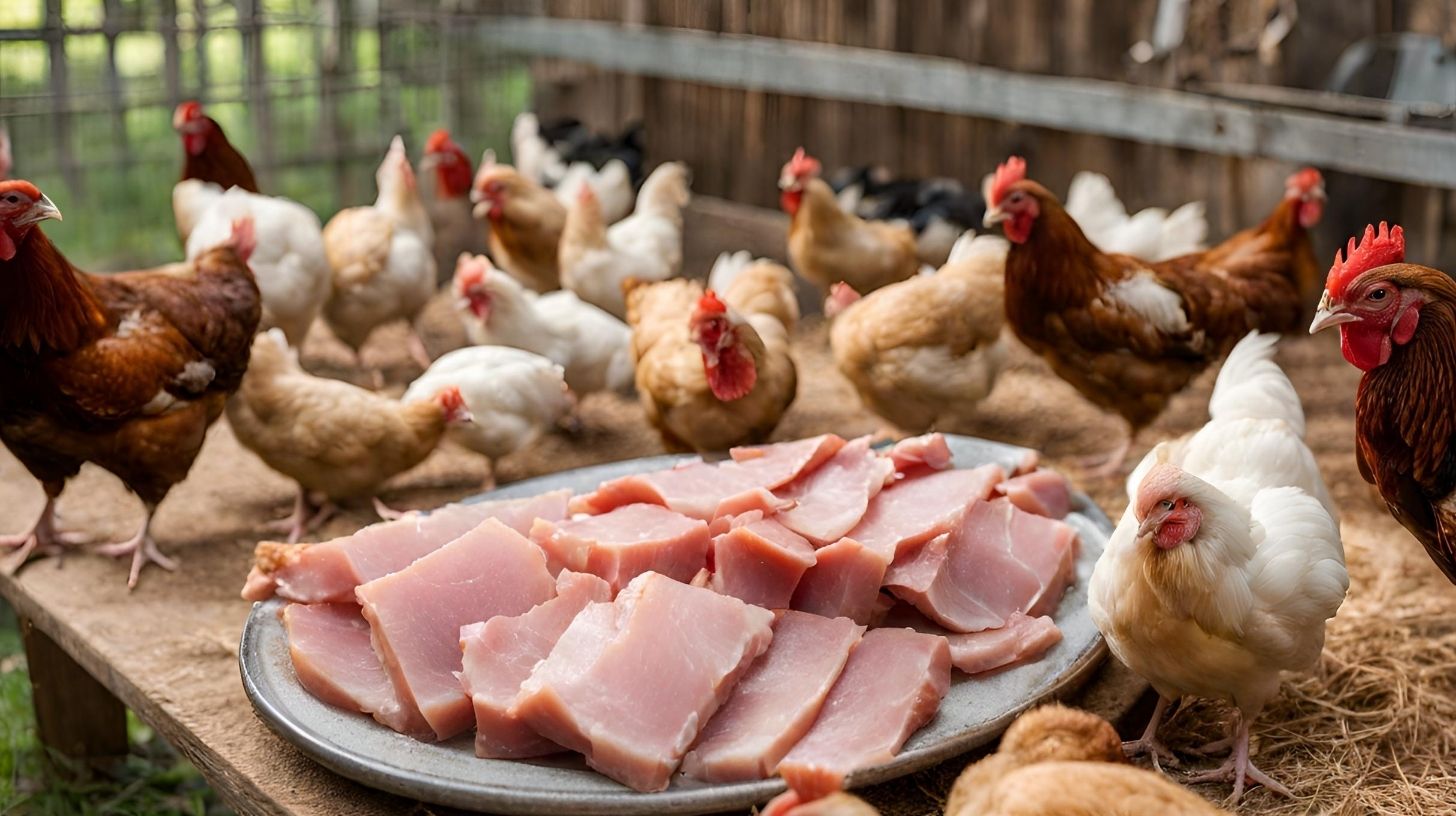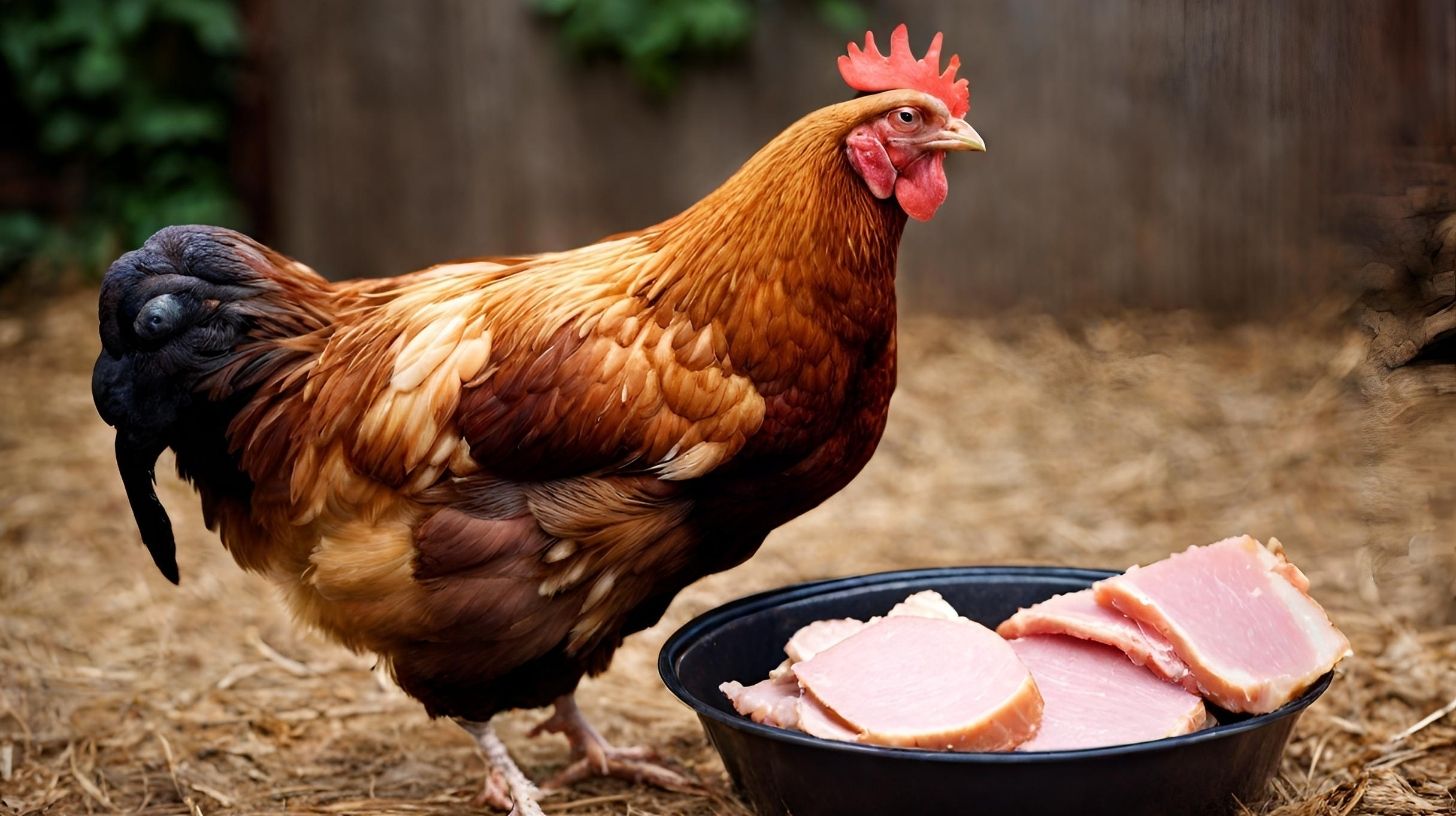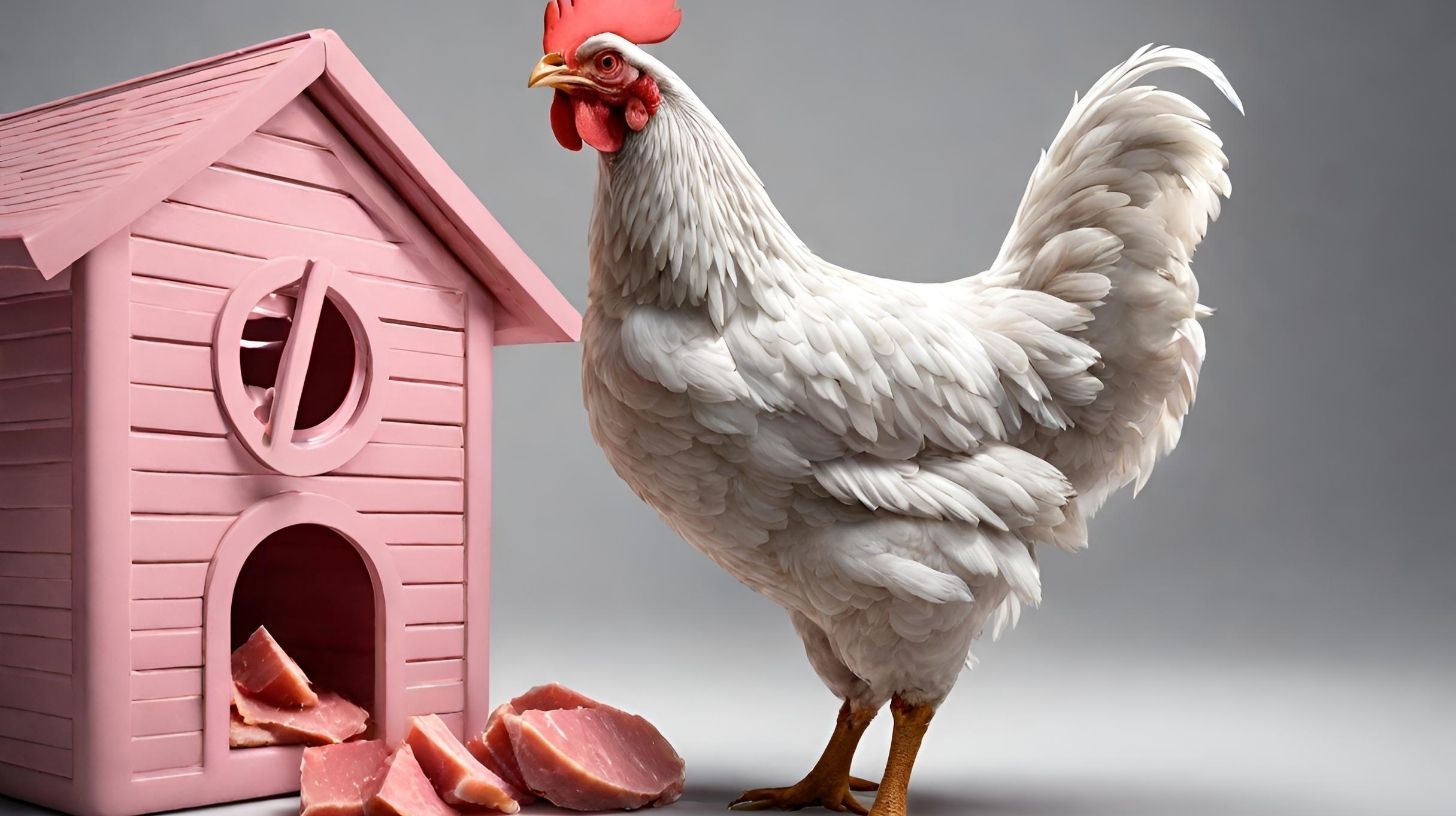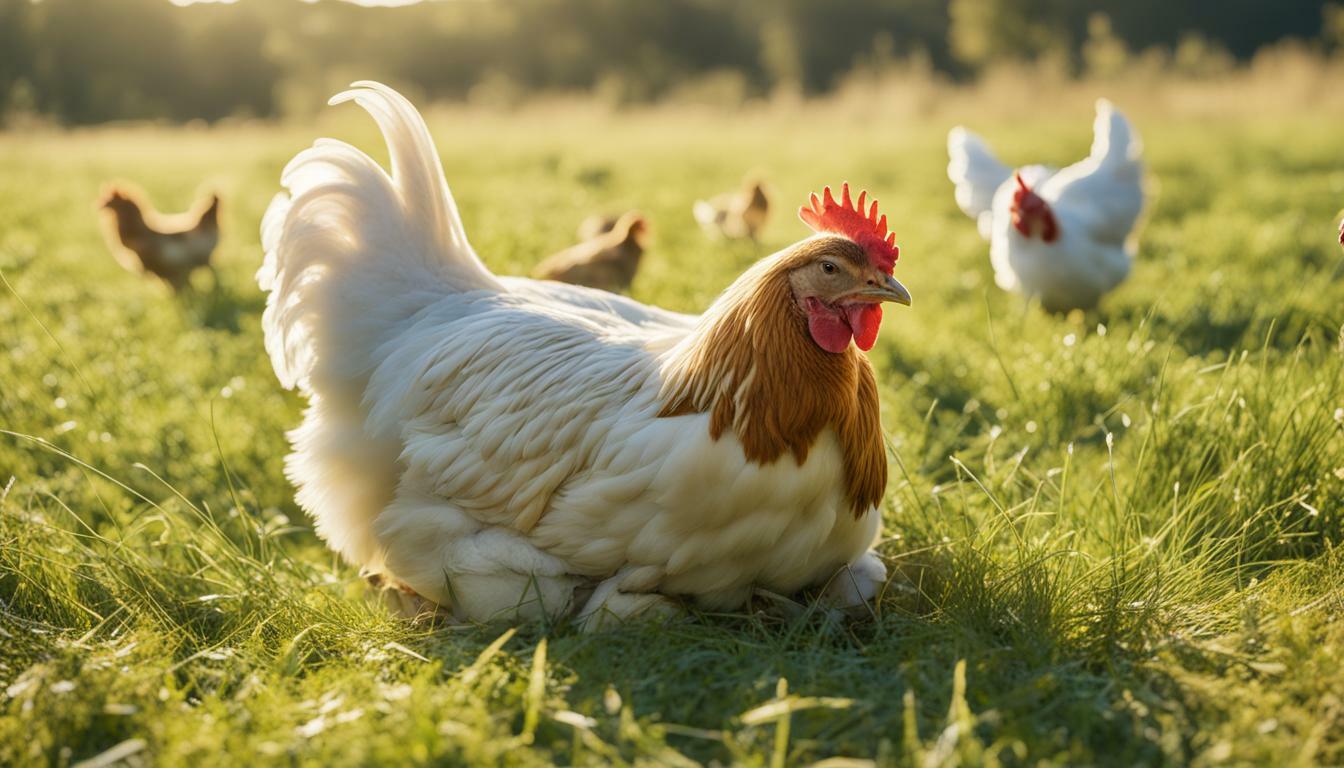Can Chickens Eat Ham? Nutrition Facts and FAQs

Table of content:
Chickens are curious, social birds that enjoy exploring new foods. As an omnivorous animal, chickens can eat a wide variety of foods besides their regular feed. Many chicken owners wonder if it’s okay to offer ham as an occasional treat.
Key Takeaways:
- Chickens can eat ham in moderation as part of a balanced diet.
- Cooked, lean ham is safer for chickens than highly processed deli ham.
- Ham provides protein and fat but can be high in sodium.
- Too much ham may lead to health issues like salt poisoning or weight gain.
- Ham scraps and bones can pose a choking hazard and are better to avoid.
- Offer ham in small amounts a few times a week at most.
As with any human food offered to chickens, ham should only be fed in strict moderation. While the occasional ham snack will likely do no harm, there are some important factors to consider before tossing ham scraps into the coop. Let’s explore the benefits and potential risks of feeding ham to chickens.
 Can Chickens Digest Ham?
Can Chickens Digest Ham?
Chickens are natural omnivores capable of digesting a variety of meats. Their digestive tract is shorter and simpler compared to many mammals, but still allows chickens to break down and absorb nutrients from animal proteins.
In the wild, chickens will eat small reptiles, amphibians, worms, and insects to supplement their diet. On farms and homesteads, chickens are often fed meat scraps like ham as a source of extra protein.
In particular, ham provides high-quality complete proteins containing all essential amino acids chickens need for growth, egg production, and good health.
So in short – yes, chickens can digest ham just fine as part of a balanced diet. The main concern is feeding ham in appropriate moderation.
Benefits of Feeding Ham to Chickens
Here are some potential benefits of supplementing your flock’s diet with the occasional ham snack:
- Added protein: Ham provides high-quality complete proteins to support muscle growth, egg production, and general health.
- Increased fat intake: In addition to protein, ham contains more fat and calories than chicken feed. This can benefit chickens entering molt or winter.
- Flavor and variety: Chickens love new treats! A bit of ham can make for motivated, happy birds.
- Reduced boredom: Varying diet with ham and other snacks can help minimize boredom-related behaviors like feather pecking.
- Minimizes waste: You can put those leftover ham scraps after holiday meals to good use by feeding them to your flock.
Risks and Precautions With Feeding Ham
While ham can make a nutritious occasional treat for chickens, there are some potential downsides to keep in mind:
High Sodium Content
The main risk with feeding ham is its high sodium content. Ham is salt-cured, meaning it contains added sodium and preservatives to enhance flavor and shelf life.
Too much dietary sodium can cause salt poisoning in chickens, leading to problems like:
- Dehydration
- Diarrhea
- Muscle weakness
- Disorientation
- Seizures
- Coma or death
To minimize the risk of excess salt intake, opt for lower-sodium cooked ham over more heavily processed deli ham or bacon.
Fat Content
In addition to being salty, some types of ham are very high in fat. Excess fat from ham can lead to obesity and related issues like fatty liver disease.
Leaner ham options like 96% fat-free black forest ham are safer. Limit ham to a few times a week and adjust feed portions to account for the extra calories from ham.
Nitrates and Preservatives
Processed deli ham tends to be cured with nitrates or nitrites. Some studies show nitrate/nitrite exposure can potentially impact thyroid function and immunity in poultry.
When possible, choose uncured cooked ham or ham cured with natural sources of nitrites like celery powder.
Bones and Choking Hazard
Chicken’s small crops and gizzards can struggle to grind and pass sharp fragments of ham bone, leading to potential choking, blockages, or internal tears.
Never feed chickens ham bones. Stick to meatier scraps and remove all bones ahead of time. Supervise chickens when feeding ham to prevent greedy gobbling.
Increased Disease Risk
There is a small risk of passing certain pathogens to chickens through undercooked or spoiled ham. Properly handle and store ham, and only feed fully cooked ham to eliminate bacteria like salmonella.
Wash hands before and after handling ham given to chickens. Never feed raw or spoiled ham.
 How Much Ham Can Chickens Eat?
How Much Ham Can Chickens Eat?
When feeding any protein-rich treat like ham, moderation is key. Follow these tips:
- Limit ham to 2-3 times per week at most to prevent excess sodium and fat intake.
- Feed ham in small portions – a few thin strips or small cubes per chicken.
- Ham should represent no more than 10% of total daily feed.
- Provide plenty of fresh water to help dilute sodium levels.
- Mix ham in with regular feed rather than free-feeding on its own.
- Adjust feed amounts on days when ham is provided by decreasing regular feed a bit.
- Avoid feeding ham daily or in large quantities. Too much can negatively impact health.
- Pay attention to droppings – loose stools may indicate too much ham or sodium.
- Discontinue ham if any chickens show signs of illness.
Suggested Ham Feeding Guidelines
Use these general guidelines for how much ham to feed backyard chickens:
| Number of Chickens | Suggested Serving Size of Cooked Ham |
|---|---|
| 1-4 chickens | 1-2 oz total ham |
| 5-10 chickens | 2-4 oz total ham |
| 10-15 chickens | 4-6 oz total ham |
*Serving size suggestions based on feeding ham 2-3 times weekly maximum
Best Practices When Feeding Ham
Follow these tips for safely feeding ham as an occasional treat:
- Choose cooked over raw ham to reduce bacteria risk
- Select lean, uncured ham when possible
- Avoid added seasonings like honey ham or maple ham
- Remove all bones ahead of time
- Chop ham into small pieces for easier digestion
- Supervise chickens when first feeding ham
- Introduce new treats gradually to avoid upset digestion
- Store ham properly until feeding time
- Wash hands before and after handling raw ham
- Discard any spoiled ham
- Don’t leave ham sitting in feeders for prolonged periods
- Adjust feed to account for extra ham calories
- Watch for signs of illness and remove ham if issues arise
Suitable Types of Ham for Chickens
You have options when it comes to selecting a safe, nutritious type of ham to share with your flock. Some better choices include:
- Cooked ham: Fully cooked ham is safer than raw since any bacteria has been killed through heating. Opt for lean cooked ham slices.
- Uncured ham: Uncured ham is preserved without artificial nitrates/nitrites and lower in sodium. Read labels when buying deli ham.
- 96% fat-free ham: Extra lean ham options contain less fat and calories. This minimizes obesity risk.
- Black forest ham: Made from pork shoulder, this type of ham is leaner with less sodium than some alternatives.
- Ham steak: Thicker ham steak has more meat and less sodium since it’s less processed. Remove the bone first.
Ham Feeding FAQs
Here are answers to some common questions about feeding ham to backyard chickens:
Can I feed chickens deli ham?
Leaner deli ham is okay in moderation, but avoid honey-baked or heavily processed kinds with lots of preservatives. Uncured ham is a healthier choice.
Can chickens eat raw ham?
No, raw ham may contain harmful bacteria like salmonella. Only feed chickens fully cooked ham.
Is ham bad for chickens?
In moderation, ham is fine for chickens. Too much can cause health problems. Feed ham sparingly 1-2 times per week as a protein supplement.
What happens if chickens eat too much ham?
Excess ham can cause sodium poisoning, diarrhea, weight gain, and other issues. Stick to feeding small amounts of ham only occasionally as directed.
Can chickens eat ham bones?
No. Chicken’s delicate digestive systems can’t safely process ham bones. The bones pose a choking and internal puncture risk. Always remove bones before feeding ham.
Can ham make chickens sick?
In rare cases, yes. Undercooked ham may contain bacteria that can make chickens sick. Too much salt and fat from ham can also cause gastrointestinal upset in some birds.
Conclusion
Ham, given occasionally and in moderation, can be a nutritious source of fat and quality protein for chickens. Take care to limit sodium content by choosing leaner, uncured ham more sparingly as a supplemental treat. Avoid overfeeding to prevent health problems. With sensible precautions, the right amount of ham can be a safe, nutritious addition to your flock’s diet.
Welcome. I’m Adreena Shanum, the proud owner of this website, and I am incredibly passionate about animals, especially poultry. I founded adreenapets.com as a labor of love, stemming from my desire to share my knowledge and experiences with poultry enthusiasts worldwide.




